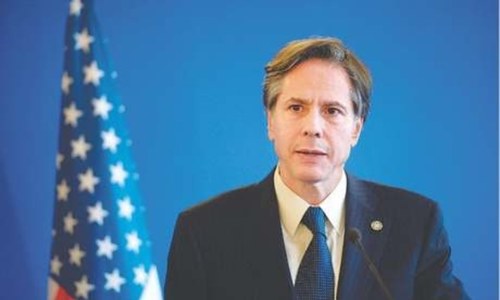WASHINGTON: President-elect Joe Biden has chosen Lloyd Austin, who led US troops into Baghdad in 2003 and rose to head the US Central Command, as the first African-American secretary of defence, US media reported on Monday.
A veteran of conflicts in Iraq and Afghanistan, the retired four-star army general, 67, beat out the favourite for the job, former under-secretary of defence Michele Flournoy, amid pressure on Biden to nominate more minority members for positions in his cabinet.
CNN, Politico and The New York Times cited unnamed sources familiar with the decision, after Biden said earlier on Monday that he had made his choice and would announce it on Friday.
Austin would require Senate confirmation to take up the post. He would also require a special waiver from the Senate due to federal law that requires military officers to wait seven years after retirement before serving as the Pentagon chief. The rule is rooted in the view that only a civilian should serve as defence secretary.
The waiver has happened twice — most recently for General Jim Mattis in 2017, President Donald Trump’s first defence secretary. But members of the Senate agreed begrudgingly, and several said at the time that they wouldn’t want to do it again.
Austin spent four decades in the army, graduating from West Point Military Academy and following a career with a wide range of assignments, from leading platoons to running logistics groups and overseeing recruiting, to senior Pentagon jobs.
In March 2003, he was the assistant division commander of the 3rd Infantry Division when it marched from Kuwait into Baghdad in the US invasion of Iraq.
From late 2003 to 2005, he was in Afghanistan commanding the Combined Joint Task Force 180, the principle US-led operation seeking to stabilise the security situation in the country.
In 2010, he was made commanding general of US forces in Iraq, and two years later became the commander of the Central Command, in charge of all Pentagon operations in the Middle East and Afghanistan.
That put him in charge of the fight against the militant Islamic State group as it captured large swathes of Iraq and Syria.
During that period, he reportedly earned the trust of Biden, who was vice president at the time.
Austin would take responsibility for the 1.2 million active service members, of whom about 16 per cent are Black.
But Black people serve disproportionately in the lower ranks, and few have achieved high command positions.
The issue became more clear over the past year when African-American servicemen and women expressed support for the national Black Lives Matter movement against police racism and abuse.
Former defence secretary Mark Esper said he held numerous listening sessions to make white soldiers understand what their Black colleagues felt.
Austin faces several challenges: first is the rule that the position should only be filled by civilians. “He shouldn’t be considered for the same reason that Sec Mattis shouldn’t have been,” said Congressman Justin Amash in a tweet.
Published in Dawn, December 9th, 2020














































